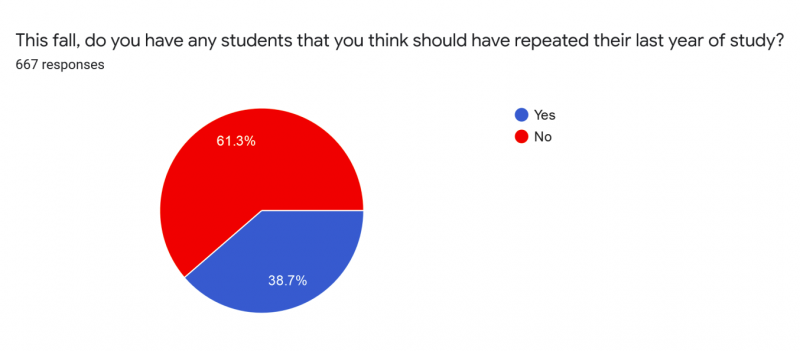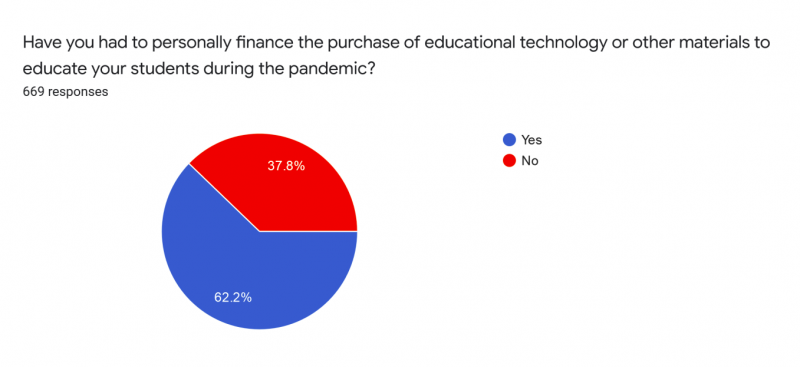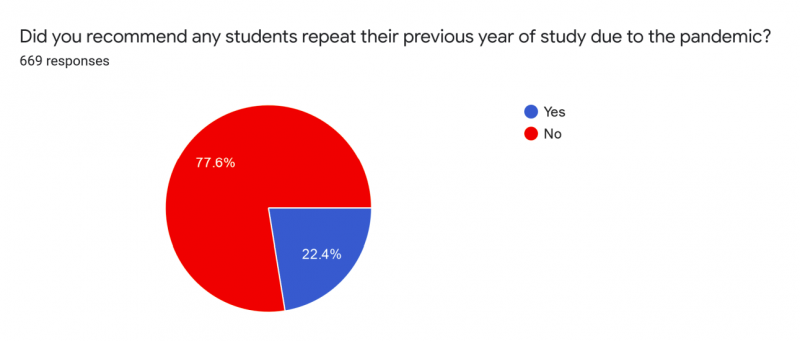Survey — 56% of Educators Working With English Learners Say Pandemic Significantly Disrupted Learning; Nearly 4 in 10 Say Students Should Have Repeated Grade

Get stories like these delivered straight to your inbox. Sign up for The 74 Newsletter
Nearly 40 percent of 669 educators who serve English language learners around the world said they should have repeated last school year because of pandemic-related learning loss, according to a recent survey.
More than 56 percent of respondents said these students’ formal education was significantly disrupted, but they were not the only children to have suffered: Most did not believe they were disproportionately affected as compared to their English-speaking peers, despite evidence to the contrary.
The answers were gleaned from a survey conducted in October by Off2Class, a company that provides curriculum, assessments and professional development tools to ESL teachers. The seven-year-old for-profit is headquartered in Canada but serves more than 90,000 students in 120 countries.
Nearly three-quarters of survey respondents were teachers: The others were tutors. Roughly half live in the United States though many are Americans living and working in other countries.

Off2Class
Several of the questions were answered on a sliding scale though teachers were able to write their responses to open-ended queries. The results reveal their concerns about the long-term consequences of lower expectations for English language learners — and about their backsliding, especially in the area of grammar.
Some respondents were concerned about students’ mental health and the return of behavioral problems usually seen in elementary school — getting out of their seat at inappropriate times and name-calling — while others wondered whether students’ enthusiasm for school would return.
“Most of them just logged in on Zoom, left the computer and pretended not to care,” one educator wrote. “My main concern is that it has made them less interested in studying/engaging in future classes.”
Still others focused on the difficulty of learning a new language without close interaction with school staff.
“I think ESL learning is extremely difficult over the internet when it comes to pronunciation,” another educator said. “Students benefit from being able to mimic mouth movement and that can get lost on video chat.”
More than 44 percent of survey-takers said their schools supplied them with sufficient technology to weather the shutdowns. But more than a quarter disagreed.
It’s not surprising, then, that more than 62 percent of respondents paid out of pocket for some of the tools they needed to serve their students during the pandemic: They spent hundreds — or, in some cases, even thousands of dollars — on additional materials, including books, computers, routers, printers, webcams, headsets and memberships to online educational resources.

Off2Class
But no matter what they purchased, problems persisted. Motivation was a significant hurdle for students learning at home. Not only did they face a massive disruption in their lives because of school closures, but they also wrestled with a faltering economy and in many cases, lost wages for themselves or their families.
Educators said they, too, felt the strain: While many respondents reported an even greater passion for their work — one said the pandemic, “has only increased my desire to improve myself so I can be of further use to my students” — some were clearly overburdened.
Not all teachers received the help they needed from their schools. While more than 48 percent said they were supported by their employers during the crisis, nearly 20 percent strongly disagreed with the statement. More than 58 percent of respondents said their stress levels rose sharply during the crisis.
“The way we are treated, the amount of work versus pay, the disrespect and disregard of teacher’s mental health,” one teacher began, “I feel like quitting for good every single day.”
Despite the burnout, there were bright spots: Nearly half the respondents — 46 percent — said their confidence in online teaching skyrocketed during the pandemic. Kris Jagasia, CEO and co-founder of Off2Class, was glad to see teachers build their skills in this area.
“Looking forward, now that ed tech is here to stay, it’s really important that technology be considered very purposefully to make sure the right investments are being made for ELLs,” he said.
Some respondents were reached through a Facebook group founded by Off2Class while others were contacted by email through the company’s customer database. Most use its software and were incentivized to participate through T-shirt giveaways and/or a $25 credit toward the purchase of the company’s goods.
The 74 contributed several questions to the survey, including those on student retention.
The results, collected between Oct. 22-29, were telling: While some educators might have wished for English language learners to have repeated a grade, only 22 percent recommended this for their own students.

Off2Class
Tim Boals is the founder and director of WIDA, an organization that provides language development standards, assessments, and resources to those who support multilingual learners. Based out of the Wisconsin Center for Education Research, WIDA has 41 member states and territories which use their language standards and follow their guidelines for teaching these children.
Boals is well aware of the disproportionate impact of the pandemic on traditionally underserved populations, including multilingual learners, but does not believe retention is the answer: He said schools should remember language acquisition takes time.
The real problem, he said, is some educators’ lack of faith in these children: If teachers label them unsuccessful, the children themselves will believe they are destined to fail.
“If we see kids as ‘behind their peers,’ the danger is that it becomes a self-fulfilling prophecy that denies them the future opportunities they need,” he said. “There are plenty of anecdotal examples of people going through most of their school careers at the bottom and then something happens that shows them their potential greatness and they turn it around.”
Success depends on a schoolwide buy-in, with every adult on campus working to create a welcoming and engaging environment for newcomer children and committing themselves to helping them learn English while they master content subjects. All this, Boals said, while respecting and building upon their students’ own languages and cultures.
“It’s a big job, but there are plenty of examples of schools that are succeeding,” he said. “We need to share those examples and ensure that educators have the resources and understanding to create and sustain those learning spaces for multilingual learners.”
Get stories like these delivered straight to your inbox. Sign up for The 74 Newsletter


